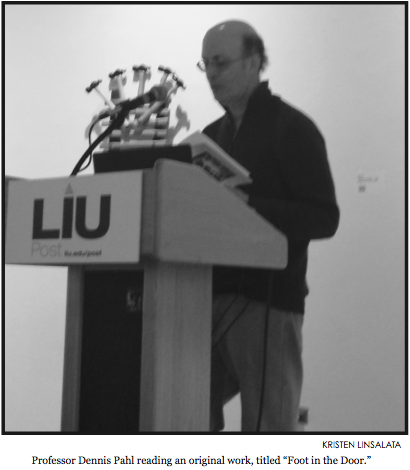By Kristen Linsalata
Staff Writer 
On Wednesday, Feb. 19, Dr. Joan Digby, a professor of English and the director of the Honors Program, organized Poetry Appreciation Day at the Steinberg Museum of Art. Students, faculty, and staff were welcomed to read their favorite poems, including poems of their own composition. Poetry Appreciation Day has been a tradition at LIU Post for over 20 years. It is an event that typically brings a gathering of 50 to 60 people, and sometimes even more. This year, the turnout was substantially lower, possibly due to the winter weather. However, this created an intimate and comfortable atmosphere.
Digby began the event with a tribute to Pete Seeger, an American folk singer and activist who died this year. The entire room was silent as Digby spoke through tears to convey the impact that Seeger had on the world, and more specifically, poetry. “I think that folk songs and ballads are among the most sincere poetry written – not just in this country, but in every folk tradition around the world,” Digby said.
Digby’s admiration for Seeger started nearly 50 years ago in 1965 when she first saw Seeger perform at Carnegie Hall. From that point on, Seeger’s influence governed the trajectory of Digby’s education. The spirit of Seeger was alive in the room as footage of his live performances was shown, and the attendees participated in a sing-along of one of Seeger’s most beloved songs, “If I Had a Hammer.” As the tribute continued, it became evident that Seeger had left an unprecedented impact on music that Digby claimed introduced “amazing musicians to the power of folk roots in poetry.”
After the Seeger tribute, Daniel Harris, an adjunct professor in the English Department, was the first to share his poetry. He read three original poems entitled, “Nihilist Pop Lyrics,” “Ode to Mallomars in Form of Word Problem,” and “Animal Planet.” Harris grappled with social and philosophical ideals in the poetry that he presented. In “Nihilist Pop Lyrics,” he used popular songs from artists such as Justin Bieber and Carly Rae Jepson and coupled them with the philosophy that life is meaningless, despite not being a nihilist himself.
“I think poetry is as important as you want it to be. I think developing an appreciation for poetry can help you to express things that you would have not otherwise expressed,” Harris said.
The only student to share poetry was Richard Renelique, a sophomore Broadcasting major. He shared his poem entitled, “Paved,” and another original poem that remains untitled. “The poem ‘Paved’ was influenced by my future, my decisions, and my career. Thinking about our generation as a whole inspired the poem that is untitled. I was thinking about what we are all meant to do, and our purpose,” Renelique revealed.
One of Renelique’s primary reasons for attending the event is his undeniable passion for poetry. “There is something that compels me to write, but for me, it can’t be in the form of a story or an essay; it has to be in the form of a poem,” Renelique stated.
The next reader was Dennis Pahl, a Professor of English. Pahl read his original short story titled, “Foot in the Door.” The story is an exploration and satire of a popular cliché. “I imagined what would happen if you took the phrase, ‘foot in the door,’ not only metaphorically, but literally, and not getting farther than that,” said Pahl. “Though my stories are not written in poetic lines, I try to make sure that they contain a certain musicality in the rhythm of the story.”
After being personally invited by Digby, Joan Harrison, a professor of Art, decided to read an original poem entitled, “Contentment.”
“I wrote the poem several winters ago – or rather it wrote itself one cold grey afternoon when I was envying my contented cat,” Harrison explained. She expressed her fondness of the poetry events, as they give the opportunity for students and professors to share their work.
Despite not initially planning to share a poem, James Bednarz, a professor of English, was overtaken by the spirit of the occasion and read two Wallace Stevens poems entitled, “The House Was Quiet and the World Was Calm,” and “The Idea Of Order At Key West.” Bednarz did not stand at the podium as the other readers did, but rather engaged the audience, and projected his voice to fill the room as he read Stevens’ poems. “Dr. Bednarz’s readings of the Wallace Stevens poems were quite amazing in their intensity, and will inspire me to look at Stevens’ work again,” Harrison stated.
“There are just so many ways that the spoken word forms itself as poetry. Pete Seeger’s social vision and Stevens’ psychological depth – that’s the kind of range that you would have in poetry itself. Poetry that can change the external world and poetry that can change the internal world and make us more conscious of who we are,” Bednarz said of the event.
The next poetry event will be held on March 25 at the Steinberg Museum of Art during common hour. Kristine Doll, a professor at Salem State University, and Dorene Evans, a nature poet, will be sharing their work.
In addition, at the Honors conference on April 4, Ifeanyi Menkiti, a Nigerian poet and professor of Philosophy at Wellesley College, will be reading his poetry. At the Honors conference, Pahl will also share his original short story entitled, “Evening Class,” and there will be a viewing of student filmmaker Greg Cioffi’s film adaption of Pahl’s “Evening Class.”
“People everywhere wake up and find that they are in chains and they are always looking for ways to rid those chains to find freedom again,” said Digby. “Poetry has been used to convey the human plight and it transfers easily from one culture to another.”



Be First to Comment